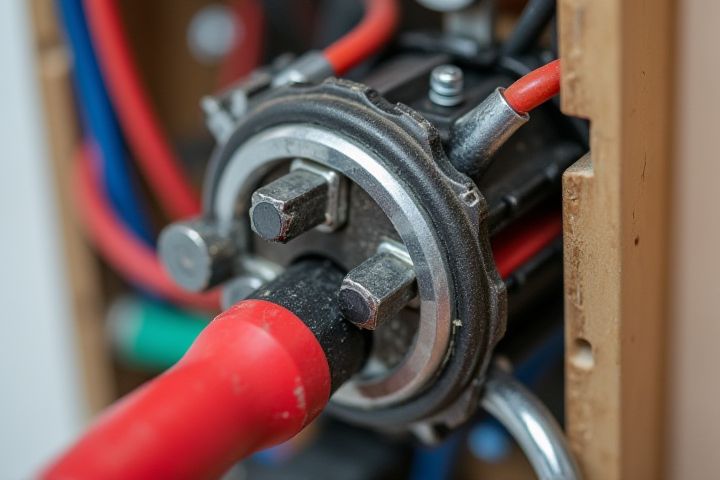
Updating house wiring is essential when you notice signs of wear, such as frayed wires or frequent circuit breaker trips. If you've added new appliances that require higher voltage, your existing wiring might not support the extra load, necessitating an upgrade. You should also consider rewiring if your home is over 30 years old, as older systems may not meet current safety codes. If you're planning major renovations that include the addition of new rooms or electrical outlets, updating your wiring will enhance functionality and safety. Regular inspections by a licensed electrician can help determine the best times for necessary updates.
When To Update House Wiring
Frequent circuit breaker trips
Frequent circuit breaker trips often indicate underlying electrical issues that necessitate a wiring update. If your circuit breaker trips more than once a month, it could signal overloaded circuits or outdated wiring systems. Homes built before 1990 may not support modern electrical demands, and upgrading your wiring can enhance safety and efficiency. To ensure compliance with current electrical codes, consult a licensed electrician who can assess your specific situation and recommend necessary improvements.
Flickering or dimming lights
Flickering or dimming lights in your home can signal underlying electrical issues that require immediate attention. These symptoms often indicate a poor connection in your wiring or an overloaded circuit, which can present risks such as electrical fires. Regularly evaluate the age of your wiring, especially if it is older than 30 years, as outdated materials may not meet current safety standards. Consider hiring a licensed electrician to assess the situation and recommend necessary updates to ensure your home's electrical system operates safely and efficiently.
Burning smells or charred outlets
Burning smells or charred outlets are critical indicators that your house wiring requires immediate attention. These signs often suggest overheating or electrical faults that could lead to fire hazards, necessitating professional evaluation. If you notice these issues, it's essential to turn off your circuit breaker and refrain from using affected outlets until a licensed electrician inspects the wiring. Regular maintenance and timely updates can ensure your home remains safe and functional, protecting both your property and family.
Outdated aluminum wiring
Outdated aluminum wiring, prevalent in homes built between 1960 and 1972, poses significant safety risks, including fire hazards, due to its tendency to overheat. If your home contains aluminum wiring, consider upgrading to copper wiring or a modern alternative, particularly if you experience frequent breaker trips or flickering lights. A professional inspection is advisable when you notice corrosion, which can appear as a grey or white powder around connections, indicating a need for immediate action. Investing in updated wiring enhances both the safety and value of your home, potentially boosting its market price by up to 20%.
Ungrounded outlets
Ungrounded outlets, often found in homes built before the 1960s, can pose safety hazards such as electrical shocks and fire risks. If you notice flickering lights, frequent circuit breaker trips, or your appliances running inefficiently, it may be time to consider an update. The National Electrical Code (NEC) recommends that homeowners prioritize replacing ungrounded outlets with grounded ones to improve safety and home value. Upgrading not only enhances the protection of your devices but also aligns your home with modern safety standards.
Reliance on extension cords
Reliance on extension cords indicates that it may be time to update your house wiring, as they are designed for temporary use and can pose safety hazards when used long-term. If you find yourself using multiple extension cords to power various devices, especially in high-demand areas, this highlights inadequate circuit capacity or insufficient outlets in your home. A general rule is to upgrade your wiring if you have frequent circuit breaker trips, dimming lights when appliances are used, or if your home was built before 1980, as older wiring may not meet current safety standards. Prioritizing an electrical upgrade can enhance safety for you and your family, ensure compliance with up-to-date codes, and improve the convenience of your electrical system.
Installation of new appliances
Updating house wiring becomes crucial when you install new appliances that demand higher power requirements, such as washers, dryers, or refrigerators. These appliances often require dedicated circuits to function safely and efficiently, allowing you to avoid potential overloads on existing wiring. It's important to ensure that your circuit breakers can handle the increased load and that wiring is up to code, particularly if your home is older. By addressing these considerations, you protect both your investment in new appliances and the safety of your home.
Electrical panel upgrade
Updating your house wiring becomes crucial when your electrical panel shows signs of wear, such as flickering lights or circuit breakers frequently tripping. You should consider an electrical panel upgrade if your power demands increase, especially with the addition of new appliances or smart home systems. Local building codes may also necessitate an upgrade to ensure safety and compliance as electrical systems evolve. Regular inspections by a licensed electrician can help you identify when an upgrade is necessary, enhancing your home's safety and electrical efficiency.
Signs of wear or damage
Signs of wear or damage in house wiring can include frayed or exposed wires, which pose a significant safety hazard. Frequent circuit breaker trips or blown fuses indicate that your electrical system is overloaded or malfunctioning. Discoloration around outlets, switches, or light fixtures suggests overheating, signaling an urgent need for inspection. If you notice a persistent burning smell or have experienced electrical shocks, it's crucial to address these issues promptly to ensure safety and compliance with local codes.
Lack of enough electrical outlets
If your home has fewer than three electrical outlets per room, it's time to consider updating your wiring. Insufficient outlets can lead to overloading existing circuits and increase the risk of electrical hazards. Additionally, modern devices often require dedicated outlets, especially for high-demand appliances like computers and televisions. Upgrading your wiring to accommodate additional outlets not only enhances safety but also improves your overall convenience and functionality in daily life.
